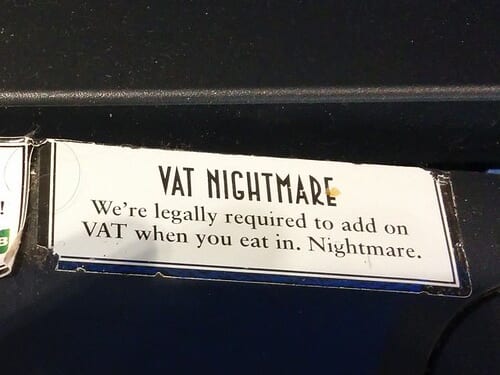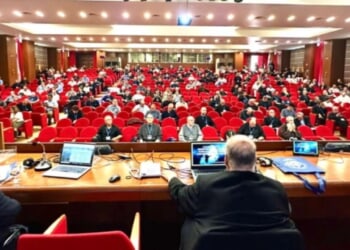Alexander Bowen is a trainee economist based in Belgium, specialising in public policy assessment, and a policy fellow at a British think tank.
There’s a classic phrase in American anti-tax campaigns, one that comes from Grover Norquist, the patron saint of America’s version of the Taxpayers’ Alliance, popularly rendered as “VAT is French for high taxes” or “VAT is French for big government”.
It’s something that comes up every time someone tries to reform America’s horrific sales tax system – a system that’s so broken you have lawyers taking home 10 per cent of the revenues in certain areas.
The complaint is, more or less, that VAT is too efficient to collect. That when it’s included in the price people won’t even notice the government taking its pound of flesh. The complaint is Reagan’s idea that “taxes should hurt” put into practice. Yes it’s annoying calculating 7.58 per cent of your $157.22 grocery bill but it’s far better than the government calculating it for you and sticking on an extra couple percentage points.
It’s a logic that is ultimately quite silly – in the end the government needs to raise revenue from somewhere and it is far better that it is raised efficiently through VAT than through culling investment or as the Americans have chosen from the most nebulous tax of all, deficit spending and inflation.
That it’s so efficient is precisely why Mel Stride should start looking at it.
Fixing VAT would be the perfect pledge to tack on to last week’s commitment to abolishing stamp duty. Something that was ultimately the perfect giveaway – popular with both the base and economists whilst being small enough to be plausible. If you tried calculating literal capital expended for political capital gained, any measurement would show it’s a politically efficient tax cut – unlike Liz Truss’ national insurance cut, one of the budgetary measures kept by Sunak and Hunt, and for which the party got absolutely zero credit.
The system’s ripe for change too.
At present just 45 per cent of potential revenues from VAT are being collected and that forty-five per cent’s being collected in such a way that the people who benefit most are lawyers adding no value (ba dum tish!). The sky high VAT registration threshold, the amount a business earns before it has to start calculating VAT, that only serves as a cap on business expansion is to blame in part, and bringing that down to cover the cost of abolishing business rates, would be a good move for both growth and small businesses and certainly be more credible than promises of unspecified cuts.
Where the real wins for both revenue and growth would be though is in dealing with the sector specific giveaways that have been infecting budgets for decades. George Osborne of course tried this with the pasty tax, quite reasonably wondering why an Asda rotisserie chicken should be VAT free when a restaurant’s rotisserie would have a 20% tax on it, or more infamously why a Greggs pasty should be tax free but a Taco Bell burrito ought pay tax. These products being, without sounding too existentialist, functionally the same.
It backfired of course, with pasty sellers going on their rent seeking march and Labour going along with it.
Much the same happened with Brexit where the ‘tampon tax’ became a beating stick that it turned out, when eventually abolished, made, as expected, no difference to the price of the thing that had been taxed. In the last two years it’s only intensified with shops jumping on campaigns to end taxes on their own products – rather than competing for customers or raising productivity they’re competing for tax revenue.
Simplifying VAT is then not just a way of raising revenues or making businesses compete not extract but actually a form of fairness and it’s one that can be surprisingly compelling. Take the Uber tax litigation that looks set to rival Jarndyce and Jarndyce in length.
After the best part of a decade of litigation, UK tax law right now (and probably only right now given the frequency of changes) states that if you order an Uber in Westminster to go to Surrey you must pay VAT yet if you order a Veezu (a functionally indistinguishable competitor) it’s tax free. If instead you order your Uber from Surrey with the destination of Westminster – it’s magically tax free, despite using the exact same road, and being the exact same journey (this latter part I am told being a subject of future debate).
The more successful company, and the one that has massively increased consumer welfare in the sector, is penalised whilst less effective competitors get subsidised by the state based on essentially irrational judicial rulings (made all the worse when you then consider what happens if it’s food riding in an Uber instead of a person).
Revenue’s left on the table, success is penalised, growth is discouraged, businesses compete through courts not markets, and tax lawyers get a never ending stream of cheques. It would even have the added advantage of never having to contemplate whether Jaffa Cakes are biscuits or cakes (a case that was resolved by baking a scaled up Jaffa Cake).
The situation’s different this time though. We’ve seen what not to do – Osborne’s one change at a time – as well as what to do.
Labour’s private school tax changed everything in that regard. They created a great example of a new unfairness (why does Rachel Reeves believe that parents sending their SEN child to a private school that can cater for their needs ought be taxed whilst PetroChina sending someone to do an £80,000 a year MBA ought go untaxed?) and a useful tool for framing VAT simplification.
Not hitting consumers making choices but hitting extractors.
The need for revenue too, and revenue raised in a non-distortive way, unlike Labour’s jobs tax, is far greater now than ever before. So whilst VAT tweaks might at times be a little painful they are just about the least painful.
Well framed, across the board VAT simplification could have ten times the impact of abolishing stamp duty and un-gumming business generally, alongside the housing market, and is just what the country needs to begin to start working again.
There’s the legacy question too.
If you could bring VAT collected from 45 per cent coverage to 90 or 100 per cent, about where New Zealand is, you could just about halve the rate. Now that would be a campaign promise – ending loopholes for big business, VAT is after all legally paid for by businesses, just as corporate tax is, to cut VAT to 10 per cent.
It’s surely worth considering.








![Florida Officer Shot Twice in the Face During Service Call; Suspect Killed [WATCH]](https://www.right2024.com/wp-content/uploads/2025/12/Inmate-Escapes-Atlanta-Hospital-After-Suicide-Attempt-Steals-SUV-Handgun-350x250.jpg)








